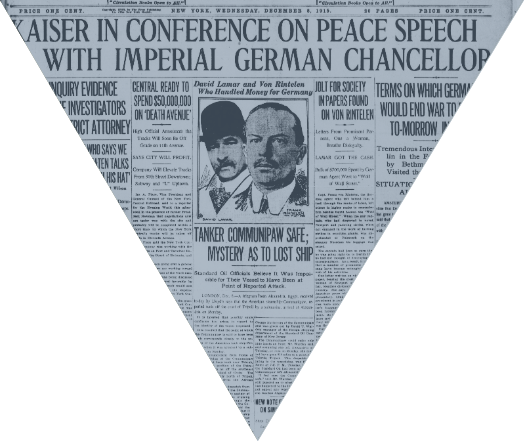the war in Europe had reached a stalemate on the Western Front. The flow of munitions and supplies from the United States to the Allied Powers, however, was still unhindered, despite the efforts of the German saboteurs. To boost the effectiveness of its operations in America, the German High Command and Germany’s military intelligence service, the Abteilung IIIb, posted Navy Captain Franz von Rintelen to the United States with orders to develop his own operations. Von Rintelen arrived in the United States in April 1915, and quickly became the most effective German spy of the war, though his time in the United States would be relatively brief.
Von Rintelen had previously lived in New York City, was fluent in English and well-established in social and financial circles, even enjoying membership in the prestigious New York Yacht Club. While he was encouraged by the Abteilung IIIb to cooperate with the German Embassy and their ongoing sabotage efforts, he was also authorized to operate independently. Von Rintelen’s arrival was discouraging to von Papen, who considered the appointment a reprimand from Berlin for inadequate results among the embassy spies. German Ambassador Johann von Bernstorff considered von Rintelen’s presence unnecessary, and fumed after their first meeting, when von Rintelen flaunted his independence in dramatic fashion by presenting Ambassador von Bernstorff with his Kaiserpass – a special passport issued by Berlin authorizing von Rintelen to receive any assistance required.



Describing himself later as “The Dark Invader,” von Rintelen immediately began developing various schemes to curb the flow of munitions across the Atlantic. Using multiple aliases and the hundreds of thousands of dollars he had been budgeted, von Rintelen established front companies, financed German-American operatives, and even brazenly used the engine room of the SS Friedrich der Grosse – one of dozens of interned German ships anchored in New York Harbor – as a facility for developing explosive devices. Though he would be long gone by the time the explosion took place, it would be von Rintelen who would identify and perform the reconnaissance on the Black Tom Island Munitions Depot in Jersey City, New Jersey, the site of the largest sabotage operation of the war.


Von Rintelen even concocted an elaborate scheme for America to go to war with Mexico. In 1915, von Rintelen met with General Victoriano Huerta, a deposed Mexican leader seeking a return to power amid Mexico’s political instability. Meeting in New York City, von Rintelen pledged German military and financial aid to Huerta’s rebel army in exchange for a promise by Huerta to attack the United States once he was restored to power. Such a conflict would tie American troops down on the southern border and prevent their deployment to Europe, should the United States join the war. British intelligence, however, was surveilling their conversation, and shared the information with American authorities. After Huerta received $800,000 in German funding (a $22 million value today) and sought to return to Mexico, he was arrested at the border by U.S. authorities and charged with sedition. This would not be the last time the Germans plotted to draw Mexico into war with the United States.


In one of his most effective operations, von Rintelen targeted munitions headed for Russia and the Eastern Front. Von Rintelen created a fake import/export company and entered into twelve different contracts for the provision of munitions and supplies to Russia. German-American and Irish dockworkers then planted incendiary devices, known as Cigar Bombs, aboard Russia-bound munitions ships. Not a single vessel reached its destination, and senior Russian officials later acknowledged that the resulting shortage of munitions contributed to battlefield defeats along the Eastern Front.
In July 1915, von Rintelen received a telegram recalling him to Berlin and, a month later, the German operative boarded a ship for the Netherlands, traveling on a Swiss passport under an alias. But British Naval intelligence had intercepted and decoded the telegram, and when the ship arrived in the English Channel, it was boarded by British sailors who removed von Rintelen at gunpoint. So important was von Rintelen to the British that he was interrogated by the Chief of Naval Intelligence, Admiral “Blinker” Hall, himself. The German spy served twenty-one months in an English prison.